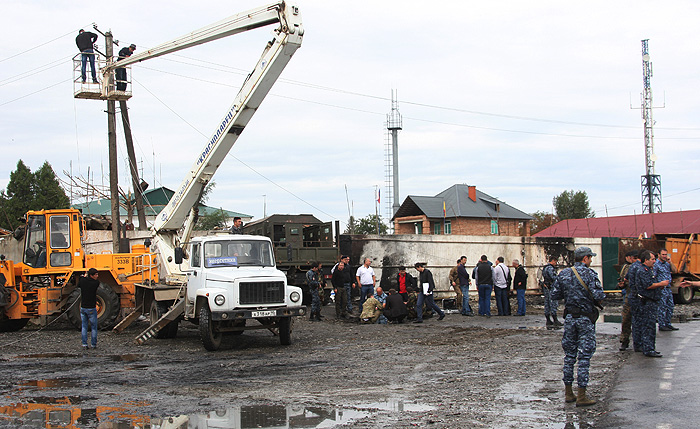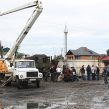
North Caucasus Leaders Adopt Kadyrov Model to Dealing with Militants
Publication: Eurasia Daily Monitor Volume: 10 Issue: 167
By:

Militants carried out two significant attacks in Chechnya and Ingushetia on September 16 and 17. The attacks took place in the districts that are adjacent to each other and have the same name—Sunzha. In the past, there was a single Sunzha district in Checheno-Ingushetia, but when Ingushetia seceded in 1992, Sunzha district was divided between Chechnya and Ingushetia, retaining its name in each.
At about 2 a.m. on September 16, a suicide attacker drove his car to the Sunzha district police station in Sernovodsk, Chechnya. After failing to drive onto the police station’s yard, the bomber blew himself up at the gate. Three people died on the spot and four others were wounded (https://www.kavkaz-uzel.ru/articles/230143/). Two of the killed were police officers dispatched from the Chuvash Republic—Leonid Puchkov and Alexander Yegorov (www.cheboksary.ru/crimen/16092013/page24266.htm). The third slain police officer, Yuni Suleimanov, was from the local Chechen police force. The suicide bomber was identified as Isa Khildikhoroev of Sunzha district’s Assinovskaya village. Experts estimated the strength of the blast outside the Sunzha district police station at 60 kilograms of TNT (https://lifenews.ru/#!news/119368). It should be noted that this was the first suicide bomber attack in Chechnya since August 2012 (https://www.kavkaz-uzel.ru/articles/230146/).
The suicide bomber in Sernovodsk was reportedly identified by Sulanbek (Salman) Machukaev, who also told police about another forthcoming attack. According to the Ingush police, Machukaev surrendered to the Sleptsovskaya district police on the morning of September 16. The Russian security services, however, said that Machukaev tried to infiltrate the district police station but was intercepted before he could detonate an improvised explosive device (IED) (https://www.interfax.ru/russia/txt.asp?id=329043). Following his arrest, Machukaev told the police that his brother Adam Machukaev was preparing another attack targeting police. According to the arrested militant, his brother was likely to be driving a stolen car.
Adam Machukaev was on the wanted list of the police in Ingushetia’s Sunzha district for participation in an illegal armed formation. The police finally located him in the Ingush Sunzha district near the village of Nesterovskaya. When Adam Machukaev realized that he could not escape, he rammed a police car. According to the police, the trunk of the militant’s car was full of explosives, and a blast that followed the collision killed one police officer and injured four others. According to the Russian National Anti-Terrorist Committee, Adam Machukaev detonated an IED when the police tried to arrest him, killing one police officer and seriously injuring three others (https://www.ingushetiyaru.org/news/36548/). Rebel news sources reported that two people died and three were wounded (https://kavkazcenter.com/russ/content/2013/09/17/100617.shtml).
According to the testimony of the arrested Sulanbek Machukaev, there were plans to attack police in several other locations. A counter-terrorism operation regime was introduced in Chechnya’s Sunzha district, which further dampened the militants’ resolve. However, while the police were able to foil the attacks, they failed to find the potential attackers (https://ria.ru/defense_safety/20130916/963476306.html).
The suicide bombers Adam Machukaev and Isa Khildikhoroev, as well as the captured militant Sulanbek Machukaev were members of a jamaat led by Beslan Makhauri that operates on both sides of the Chechen-Ingush border (https://www.itar-tass.com/c21/877972.html).
The reaction of the authorities in the two republics to the suicide attacks was peculiar. The press service of the head of Ingushetia reported that the republic’s police placed the blame for the terrorist attacks in the republic on the Chechen authorities, saying that the militants were infiltrating Ingushetia from Chechnya (https://www.ingushetia.ru/m-news/archives/019319.shtml).
Ramzan Kadyrov returned the favor, explaining on his Instagram account: “We cannot simply watch how guerrillas coolly load a car with explosives in the neighboring territory and then our people die” (https://news.mail.ru/inregions/caucasus/26/society/14795703/). Kadyrov then called on the Ingush authorities to cooperate in the fight against the militants. An unsuspecting reader would think that the leaders of two sovereign states were discussing security issues, whereas, in fact, both territories are just administrative units of the Russian state.
Meanwhile, the recently appointed head of Ingushetia, Yunus-Bek Yevkurov reacted by promising measures like those taken by the Israeli and Chechen authorities. “We will expropriate the homes of the people who are helping the bandit underground, (who) rent their houses, their territory to the bandits,” he said. “Instead, we will give the homes of the accomplices to those who need housing or will build public buildings on the sites of those houses” (https://www.ntv.ru/novosti/659717). Contemplating a large negative backlash across the country, Yevkurov the next day amended his comment, saying that he meant “abandoned, unused buildings, where members of illegal armed groups are finding refuge and plotting their dirty crimes” (https://magas.su/tera/yunus-bek-evkurov-snositsya-budut-te-domakotorye-ispolzuyutsya-zabrosheny-khozyaevami). He also proposed expanding work to raise public awareness to ensure that Ingushetia’s residents know that supplying food and other services to the militants was under a strict ban. Thus, Ingushetia’s leader has begun employing the same methods as Ramzan Kadyrov in Chechnya.
However, this is not a mere replication of his neighbor’s tactics. The Dagestani leader, Ramazan Abdulatipov, has chosen approximately the same tactics. So one can observe Moscow’s general strategy in the North Caucasus, when in exchange for a free hand at the local level, Moscow’s protégé should ensure well-being in his republic and provide favorable results during elections (https://ria.ru/analytics/20130515/937476998.html). Therefore, this is not a spontaneous reaction of a regional bureaucrat to the bomb attacks in the North Caucasus. Rather, it is essentially a colonial system that allows the central state to put part of the responsibility on the regional leaders, in exchange for the appearance of peace.
This system worked fairly well in the 19th century and even under Communism in the 20th century. However, there is no way for this system of governance not to backfire and result in Moscow’s loss of control over the region. Even fragile autonomy eventually makes people want complete sovereignty. The more Moscow relies on its regional henchmen, the more the region drifts away from Russia psychologically, toward complete independence.




